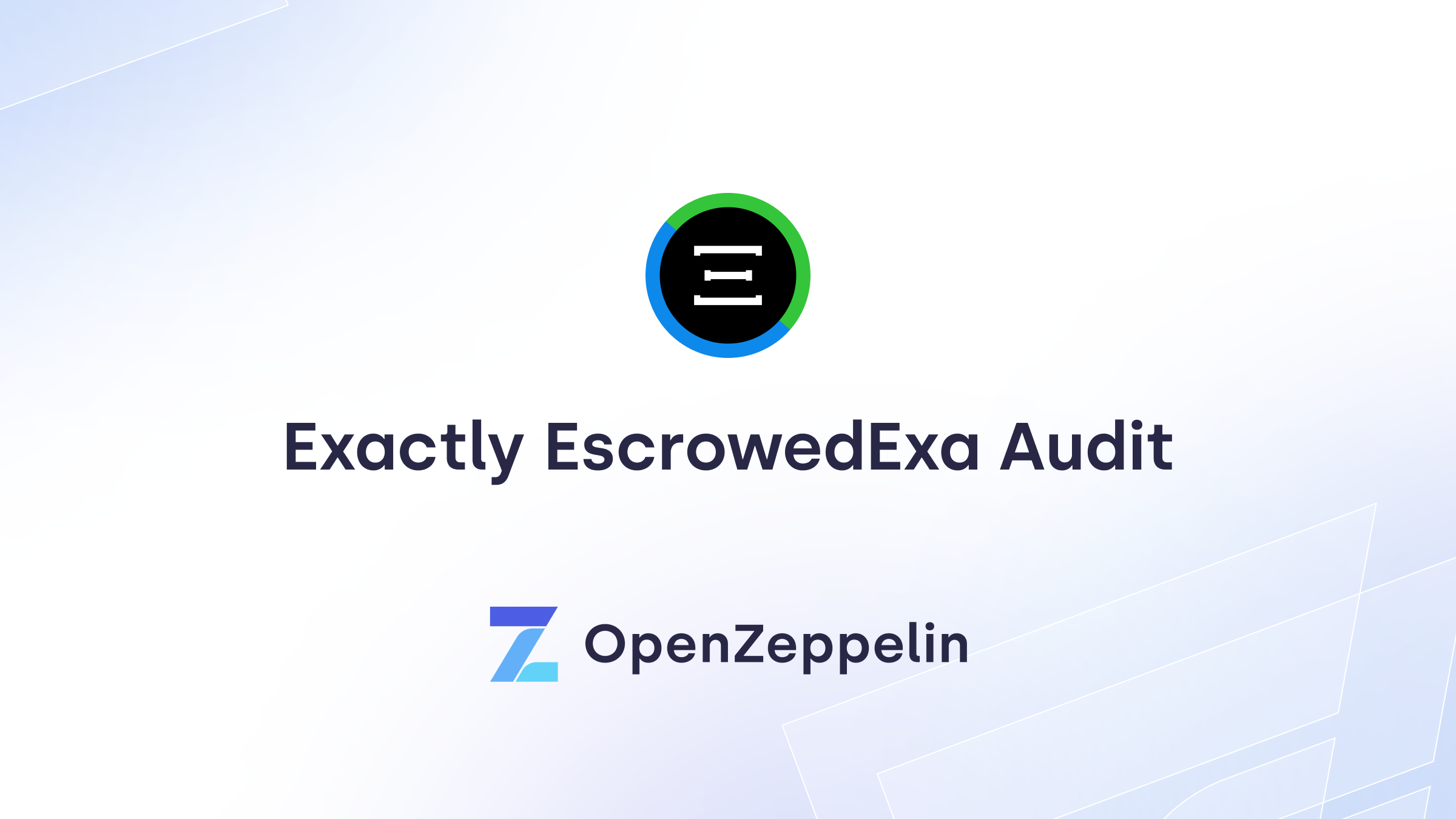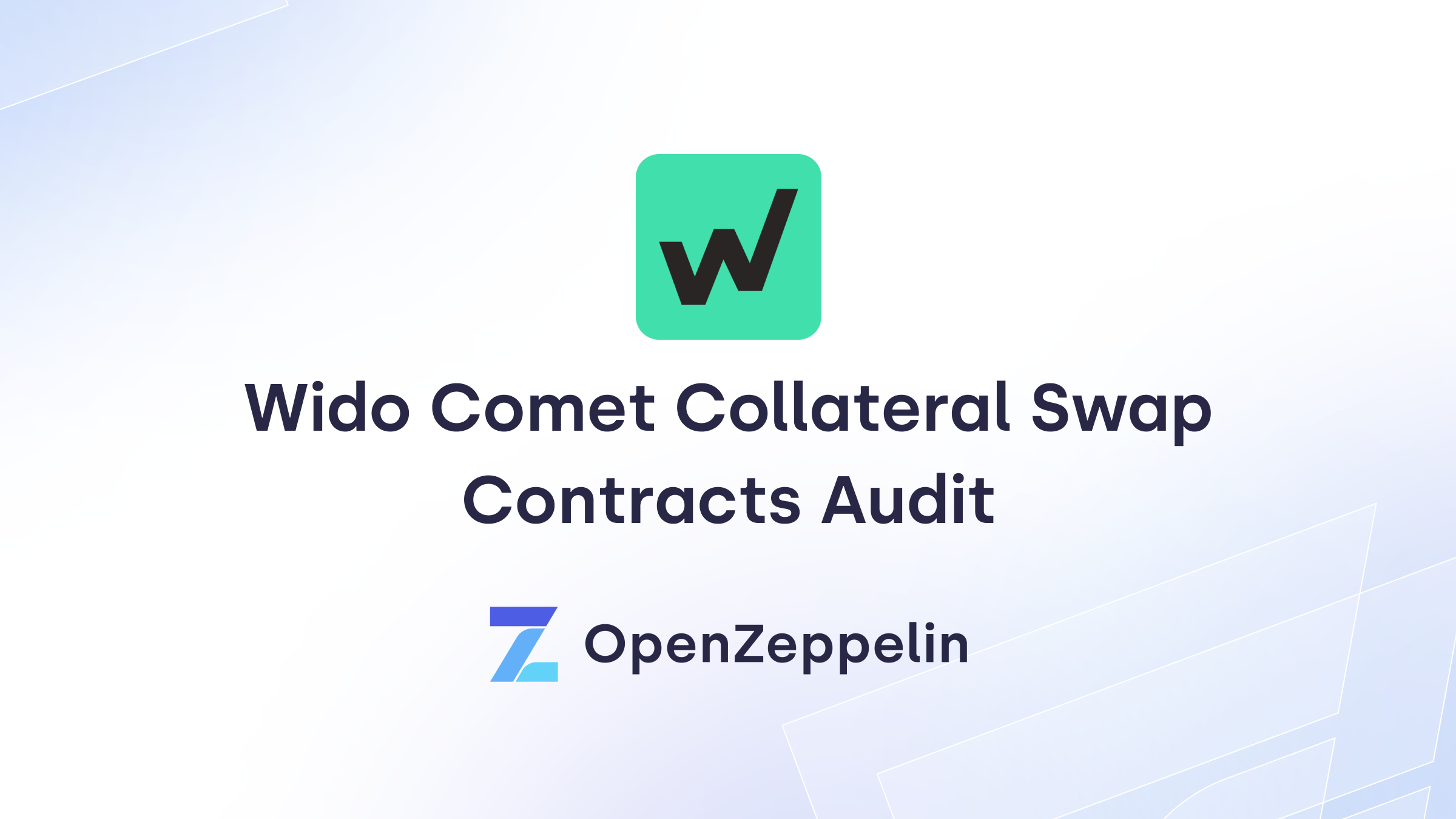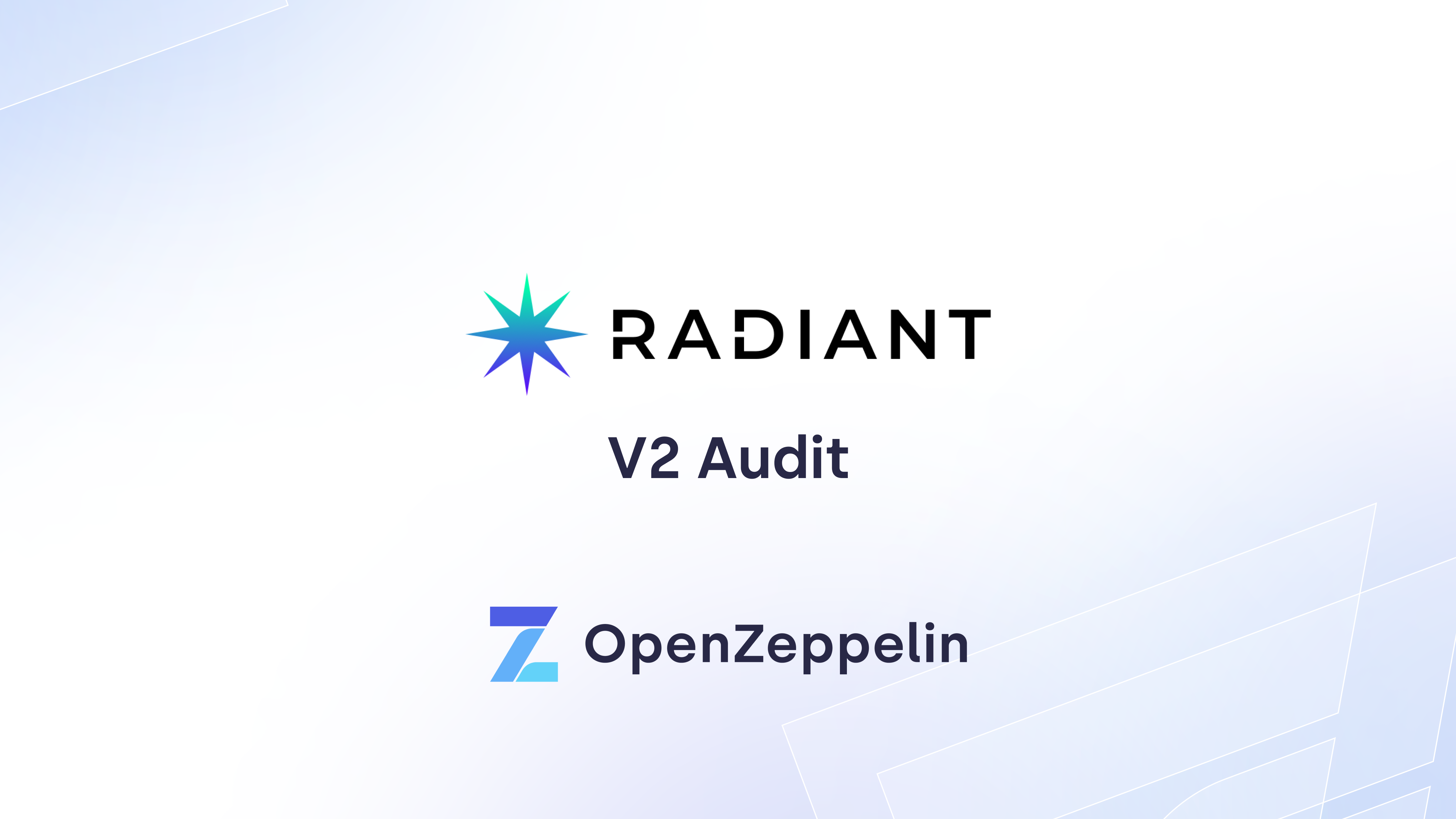May 11, 2023
This security assessment was prepared by OpenZeppelin.
Table of Contents
Summary
- Type
- Bridge
- Timeline
- From 2023-02-21
- To 2023-03-06
- Languages
- Solidity
- Total Issues
- 11 (11 resolved)
- Critical Severity Issues
- 0 (0 resolved)
- High Severity Issues
- 0 (0 resolved)
- Medium Severity Issues
- 0 (0 resolved)
- Low Severity Issues
- 4 (4 resolved)
- Notes & Additional Information
- 7 (7 resolved)
Scope
We audited the across-protocol/contracts-v2 repository at the c01d48cdb2e72812b6b9780fe215d44faced50ba commit.
In scope were the following contracts:
contracts
├── BondToken.sol
├── Optimism_SpokePool.sol
├── SpokePool.sol
├── Succinct_SpokePool.sol
├── chain-adapters
│ ├── Optimism_Adapter.sol
│ └── Succinct_Adapter.sol
└── upgradeable
└── EIP712CrossChainUpgradeable.sol
The following contracts were also in scope, but only regarding their upgradeability:
contracts
├── Arbitrum_SpokePool.sol
├── Boba_SpokePool.sol
├── Ethereum_SpokePool.sol
├── Ovm_SpokePool.sol
└── Polygon_SpokePool.sol
Update: As part of the fix review process, we also reviewed the following pull requests:
- PR #249: Emit FundsDeposited event directly
- PR #264: Fix handling of refunds on other chains and partial fills
- PR #267: Fix potential underpayment in slow fill with negative LP fees
- PR #268: Apply rounding consistently to partial and full fills
System Overview
The Across protocol provides a cross-chain bridge acceleration mechanism for token transfers between Layer 2 (L2) chains and the Ethereum mainnet, as well as between L2 chains. Fast cross-chain transfers are achieved by providing economic incentives to third-party actors, called relayers, who fill users' requests for cross-chain funds transfers by using their own funds, which already reside on the destination chain. To ensure there is sufficient liquidity for relayer refunds, the liquidity providers receive fees in return for adding liquidity to the protocol.
At the core of the protocol are a single HubPool contract and multiple SpokePool contracts. The HubPool is deployed on the Ethereum mainnet, and a single SpokePool is deployed on each supported chain. SpokePools differ slightly from one another to accommodate the specific requirements of different chains.
To accomplish a cross-chain transfer using Across, a user deposits funds on the origin chain and specifies the destination chain where they want to receive the funds. This emits an event which is monitored by the off-chain relayers. A relayer then fills the deposit with their own funds on the destination chain, effectively transferring user funds from origin to destination. The relayer is later reimbursed by the protocol.
To incentivize relayers and liquidity providers, part of the user-deposited funds are set aside in the protocol in the form of the relayer and liquidity provider fees. There is also a protocol fee which is currently set to zero but reserved for future use.
If a deposit is not filled or only partially filled, the protocol uses its own funds to execute a slow relay to fill the request.
The protocol implements a pool rebalancing procedure which ensures that SpokePools have enough funds to refund relayers and execute slow fills. Rebalancing also moves excess funds from SpokePools to the HubPool.
Relayer refunds, slow relays, and pool rebalances are accomplished by the proposal of a root bundle to the Optimistic Oracle by a dataworker. The root bundle is a Merkle root constructed in accordance with the UMIP specification(s). Unless disputed, the root bundle is optimistically accepted after a liveness period has passed.
When the root bundle is executed, the HubPool sends a cross-chain message to SpokePools by providing Merkle tree roots of relayer refunds and slow relays along with tokens. When it comes to actually executing relayer refunds, a Merkle proof is provided and verified on the SpokePool's side.
Summary of Changes
As mentioned in the Scope section, this audit focused on the latest additions to the protocol, rather than the entire codebase. Here we present a summary of the new major features:
- SpokePools have become upgradeable contracts.
- Support for chains without the canonical bridge infrastructure has been added. This is achieved by utilizing the Telepathy protocol of Succinct. Since it is not possible to transfer tokens to Succinct SpokePools, negative fees have been introduced to incentivize users to move funds from high-liquidity SpokePools to low-liquidity ones. A negative fee translates to a reward for a depositor to use the Across protocol. As a counterbalance, the protocol compensates relayers that fill such requests. The computation of these relayer rewards is performed off-chain and integrated into the refund proposal data.
- A custom BondToken has been introduced, which enables the whitelisting of bundle proposers. Disputes, however, can still be submitted by anyone.
- Support for EIP-1271 and EIP-712 signatures has been added. EIP-1271 in particular allows users to invalidate a deposit update after submitting it.
- A non-canonical bridge is now used to transfer SNX tokens on Optimism.
- Pause functionality has been added for deposits and fills.
Security Model & Trust Assumptions
The Across protocol relies on the Optimistic Oracle together with the UMIP specification(s), canonical and non-canonical bridges, and the off-chain software consisting of the relayer and dataworker implementation.
The Optimistic Oracle, which is controlled by UMA token holders, has the ability to resolve disputes on root bundles. This means that if it is compromised, it is possible for disputes to not resolve correctly, and, more importantly, whoever can control the Optimistic Oracle can decide how funds are moved within the system. This is a feature of the greater UMA ecosystem, and incentives exist to keep the Optimistic Oracle honest.
The UMIP specification(s) describe what constitutes a valid root bundle and are a critical component. A loophole or inconsistency in them may lead to consequences comparable to smart contract vulnerabilities. Even if specifications are flawless, there is still a risk that a bug in the off-chain software, which mainly refers to relayer and dataworker implementations, may be abused to achieve similar effects.
Finally, the system depends on the security and behavior of canonical and non-canonical bridges.
Privileged Roles
There is one administrator for the entire Across Protocol system. This administrator can make decisions regarding which chains have valid SpokePools, which tokens are enabled, and how tokens on one chain map to tokens on another. The administrator also controls parameters such as the system fee percentage, where fees are directed, the bond amount for proposing new root bundles, how disputed root bundles are identified, and which tokens are allowed within the system. Finally, they can cancel or delete root bundles and pause deposits and fills.
With the addition of BondToken, the administrator also manages the proposers' whitelist.
Client-Reported Findings
Incorrect handling of refunds taken on other chains
Client reported: UMA identified this issue after the audit.
The fillCounter is intended to provide frontrunning protection by tracking anticipated decreases to a SpokePool's balance. For example, in the simple case where a relayer executes a full fill for a 100 token deposit, the chain's fillCounter is incremented by 100. If the relayer chooses to take their refund on the same destination chain, depositors can precompute their deposit incentive fees based on the knowledge that 100 tokens will be removed from this SpokePool once the relayer is refunded. Since the pool's running balance has decreased, the incentive to deposit has increased in a predictable way. The logic also works correctly if this relayer were to instead perform a partial fill and a slow relay completes the fill--the net result is still that the SpokePool balance decreases by 100.
However, the logic does not take into account that relayers can request to take their refund on a different chain, i.e. repaymentChainId != destinationChainId. Applied to the above example, the fillCounter on the destination chain's SpokePool will be increased even though its balance will not change. Likewise, the repayment chain's SpokePool will not be updated to reflect a change in its running balance. As a result, depositors on the repayment chain can be frontrun by relayers in this scenario because the fill counters are not being updated correctly.
Additionally, in the case of multiple partial fills, the _updateCountFromFill function simply updates the fillCounter by the total fill amount once the first partial fill occurs, even though relayers can submit subsequent partial fills with refunds on different chains.
Update: Resolved in pull request #264 at commit ef59e2a.
Potential underpayment in slow fill with negative LP fees
Client reported: UMA identified this issue after the audit.
In the case of a slow relay on a deposit with a negative LP fee, the maxSendAmount passed into the _fillRelay function could cause fillAmountPreFees to be less than the amount, which means it could be less than amountRemainingInRelay. In this case, two errors occur: a) the slow fill does not complete the fill, resulting in underpayment of the recipient, and b) the payoutAdjustmentPct is ignored, because it is inside the if statement comparing fillAmountPreFees to amountRemainingInRelay.
Update: Resolved in pull request #267 at commit 01e6ec4.
Change recipient/message feature does not work
Client reported: UMA identified this issue after the audit.
There is a feature that enables changing the recipient and the message. The feature was not working, so if someone deposited funds into an address that was unable to receive them, the funds would become stuck. The bug only occurs if a user makes a mistake - the attacker would not be able exploit this at will to steal money.
Update: Resolved in pull request #276.
OpenZeppelin-Reported Findings (after the audit)
Stealing ETH from the dataworker
OpenZeppelin reported: OpenZeppelin identified this issue after the audit.
The attacker can create a deposit with a recepient and a message that will not be filled by relayers (e.g. because the relayer fee is set to zero). Eventually, the slow fill process will be triggered. In the end of the process the dataworker finalizes the slow fill, which calls back to the attacker's contract, which can now execute code at the expense of the dataworker.
Update: Resolved in pull request #647.
Low Severity
Incorrect or misleading documentation
Several instances of docstrings or comments in the codebase were found to be erroneous. In particular:
- In the
SpokePoolcontract's_fillRelayfunction, the comment on line 1003 appears unrelated to theifstatement on the following line. Consider revising the comment. - The docstring for
pauseDepositsin theSpokePoolcontract says it "pauses deposit and fill functions", but pausing fill functions is performed by callingpauseFills, which does not have a docstring.
Consider revising the pauseDeposits docstring and adding a docstring to pauseFills.
Update: Resolved in pull request #251 at commit 21d9ed8.
Lack of event emission after sensitive action
The setSuccinctTargetAmb administrative function does not emit a relevant event after changing the succinctTargetAmb address.
Consider always emitting events after sensitive changes take place to facilitate tracking and notify off-chain clients that follow the protocol's contracts' activity.
Update: Resolved in pull request #252 at commit 10c1190. Additionally, new ReceivedMessageFromL1 events were added to the Polygon_SpokePool and Succinct_SpokePool's message handler functions (processMessageFromRoot and handleTelepathy, respectively).
Missing docstrings
Throughout the codebase, there are several parts that do not have docstrings. In particular:
AdapterInterface.sol, lines 13-20: The interface functions are undocumented.Arbitrum_Adapter.sol, lines 9-54: TheArbitrumL1InboxLikeandArbitrumL1ERC20GatewayLikeinterfaces and their functions are undocumented.LpTokenFactoryInterface.sol, lines 4-5: The interface and its functions are undocumented.Optimism_Adapter.sol, lines 15-16: TheSynthetixBridgeToOptimisminterface and its function are undocumented.Polygon_Adapter.sol, lines 10-30: TheIRootChainManager,IFxStateSender, andDepositManagerinterfaces and their functions are undocumented.Polygon_SpokePool.sol, line 11: TheprocessMessageFromRootfunction is undocumented.SpokePool.sol, lines 169-196: TheRelayExecution,RelayExecutionInfo, andDepositUpdatestructs have undocumented members.Succinct_SpokePool.sol, line 39: Theinitializefunction has no docstring.Succinct_SpokePool.sol, line 57: ThehandleTelepathyfunction has no docstring.WETH9Interface.sol, lines 4-11: The interface and its functions are undocumented.ZkSync_Adapter.sol, lines 13-30: TheZkSyncLikeandZkBridgeLikeinterfaces and their functions are undocumented.ZkSync_SpokePool.sol, lines 6-12: TheZkBridgeLikeinterface and its function are undocumented.
Consider thoroughly documenting all functions (and their parameters) that are part of any contract's public API. Functions implementing sensitive functionality, even if not public, should be clearly documented as well. When writing docstrings, consider following the Ethereum Natural Specification Format (NatSpec).
Update: Resolved in pull request #253 at commit 5d1090a, pull request #242 at commit 4a8fe1c, and pull request #269 at commit 146f2f2.
The ZkSync_Adapter.sol and ZkSync_SpokePool.sol contracts were not changed. The UMA team stated:
All suggested comments are implemented except for zkSync contracts which were out of this audit's scope and are still in progress and not live.
updatedRelayerFeePct can be lower than expected
In the SpokePool contract, the speedUpDeposit function performs the following check on the updatedRelayerFeePct variable:
require(updatedRelayerFeePct < 0.5e18, "invalid relayer fee");
Unlike the equivalent check in the deposit function, in this case the SignedMath.abs function is not used, which allows the updatedRelayerFeePct value to reach or go below the lower limit of -0.5e18. An attempt by the relayer to fill this request will be rejected by the _fillRelay function's fee check.
Consider using the SignedMath.abs function to ensure the updatedRelayerFeePct argument provided to speedUpDeposit is within the expected limits.
Update: Resolved in pull request #254 at commit 857e787.
Notes & Additional Information
Interface files not in interfaces directory
The Across Protocol V2 codebase contains the interfaces directory, but the HubPoolInterface.sol and SpokePoolInterface.sol files do not reside in that location. Instead, they are located in the parent directory.
Consider moving all non-external interface files to the interfaces directory, so that interfaces can be more easily located.
Update: Resolved in pull request #255 at commit fa59467.
Multiple conditions in a single require statement
There is a require statement with multiple conditions in the handleTelepathy function of the Succinct_SpokePool contract.
Consider isolating each condition in its own separate require statement with a corresponding error message, to more easily identify the specific condition that failed.
Update: Resolved in pull request #256 at commit c42ea4f.
Redundant condition in if statement
In the SpokePool contract, the _updateCountFromFill function is responsible for updating the fillCounter data when a fill takes place. No update is necessary in the following three cases: when the action is either a slow fill or an initial zero-fill, or when a partial fill for that request has already happened.
However, in the case of a zero-fill the execution flow will not reach this function, which makes the condition endingFillAmount == 0 redundant.
Consider removing the redundant condition for increased clarity, readability, and gas savings. For extra safety, consider adding a comment where the function returns if there is a zero-fill, denoting that any updates to this part should take the function _updateCountFromFill into account.
Update: Resolved in pull request #264 at commit ef59e2a. The endingFillAmount == 0 condition has been removed and a comment has been added to clarify that initial zero-fills will not reach this location in the code.
Typographical errors
Consider correcting the following typographical errors:
-
In
BondToken.sol: -
In
EIP712CrossChainUpgradeable.sol:- Line 83: "its always" should be "it's always".
-
In
MultiCallerUpgradeable.sol:- Line 5: "@title MockSpokePool" should be "@title MultiCallerUpgradeable".
-
In
Optimism_Adapter.sol:- Line 23: "its only" should be "it's only".
-
In
Polygon_SpokePool.sol: -
In
SpokePool.sol: -
In
Succinct_Adapter.sol: -
In
Succinct_SpokePool.sol:
Update: Resolved in pull request #258 at commit 43a0ea7.
Unnecessary modulo operation
The setClaimed1D function in MerkleLib.sol performs a modulo 256 operation on index to yield a result in the range [0, 255]. However, index is a uint8 variable, so the operation index % 256 is equivalent to index.
Consider removing the redundant modulo operation.
Update: Resolved in pull request #259 at commit 04c8488.
Unused imports
The following imports are unused:
- Import
AdapterInterface.solinHubPoolInterface.sol - Import
ECDSA.solinSpokePool.sol
To improve readability and avoid confusion, consider removing any unused imports.
Update: Resolved in pull request #260 at commit 4a94713.
Use of hard-coded values
The _bridgeTokensToHubPool function in the Ovm_SpokePool contract contains two hard-coded addresses that are not explicitly documented.
Consider creating constants to store these values, and assigning them descriptive variable names.
Update: Resolved in pull request #261 at commit 6f8b6e3.
Conclusions
Several low-severity issues were identified, as well as some notes to increase the quality of the codebase. Some changes were proposed to ensure smart contract security best practices are followed. The Across protocol, however, heavily relies on relayer and dataworker UMIP(s), their off-chain implementations, and the Optimistic Oracle. As described in the Security Model and Trust Assumptions section, a bug in any of these may lead to a severe loss of funds, and thus a full-system security audit is recommended.
Appendix
Upgradability Considerations
The following are additions to the process described in the Across draft SpokePool upgrade process to ensure a safe migration.
The migration procedure from non-upgradeable to upgradeable SpokePools should ensure that no funds are lost or locked in the process. Before the migration, it is recommended to ensure that:
- All token routes on the chain where the SpokePool resides are disabled.
- All outstanding deposits on the chain where the SpokePool resides are filled.
- All refund leaves are executed.
- All slow-relay leaves are executed.
- Funds that are left in the SpokePool are returned to the HubPool.
- The root bundle is empty.
- There is no root bundle in transit (i.e., the cross-chain message was sent but not yet executed).
Monitoring Recommendations
While audits help in identifying potential security risks, the UMA team is encouraged to also incorporate automated monitoring of on-chain contract activity into their operations. Ongoing monitoring of deployed contracts helps in identifying potential threats and issues affecting the production environment.
To ensure no unexpected administrative actions are occurring, and to validate that correct values were used, consider monitoring all SpokePool administrative events, i.e. events emitted from functions with the onlyAdmin or onlyOwner modifier. In particular, consider monitoring:
-
The occurrence of
PausedDeposits,PausedFills, andEnabledDepositRouteevents to ensure that a pool is not unintentionally placed in a partially disabled state. -
The addresses and other data emitted in the
SetHubPool,SetXDomainAdmin,EnabledDepositRoute,SetDepositQuoteTimeBuffer, andEmergencyDeleteRootBundleevents to validate they match the input values. -
The occurrence and values of events specific to a particular SpokePool, such as
Polygon_SpokePool'sSetFxChildandSetPolygonTokenBridgerevents.
Bridge servers experiencing downtime may disrupt the operation of the Across protocol. Consider monitoring the up/down status of bridge nodes, e.g. the availability of the Arbitrum Sequencer.
Consider monitoring for abnormally large or small deposit and fill values, which may indicate an ongoing attack.


